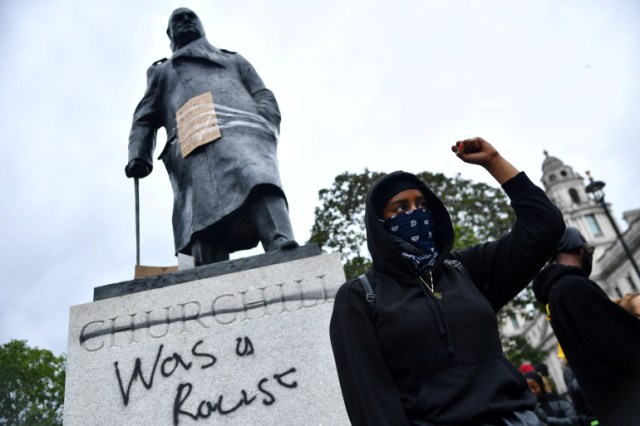British police have guarded a historic statue of the famous British warlord Winston Churchill, since it became one of dozens of targets for anti-racist activists, and demanding an end to the general honor of people who played leading roles in the slave trade and imperialism.
Churchill appears to be safe today, but there are many other famous names that could join Edward Coulston, an 18th-century slave merchant, and Robert Milligan, the slave owner who established a world trade center in London, in terms of losing their memorial places in British cities.
Many - including British Prime Minister Boris Johnson - Churchill, are considered a hero who stood up to Nazi Germany and gave historic speeches to the nation at pivotal moments during World War II.
Churchill is also accused of espousing views on white supremacy and overseeing brutal politics in India, the "crown jewel" of the former British Empire.
The backlash against the demands of the "Life of the Blacks is Important" movement, which is protesting police violence against African Americans, and other groups is also mounting. Right-wingers staged counter-protests, while conservative scholars and politicians defended Churchill, Colston and other controversial personalities.
The Colston statue has been dropped in a port in the southwestern city of Bristol, which was considered one of the most important slave trade ports in Britain.
About 20,000 people signed an electronic petition to replace the statue with another dating back to Paul Stephenson, a civil rights activist of African descent during the 1960s, in Bristol.
precedent
"I think the demonstrators in Bristol have set a precedent that should make us question our understanding of history, and how to link our antiquities and our architecture with colonialism," said Remy Joseph Salisbury, an ethnologist at the University of Manchester.
In an attempt to appease the petitioners, the southern city of Plymouth promised to add an "explanatory text indicating his role in the slave trade", along with a famous statue of the sailor and well-known politician Francis Drake from the 16th century.
Drake - who helped Queen Elizabeth I in 1588 defeat the Spanish fleet - was a pioneer in the British slave trade.
Initially, the British demonstrators - who gathered after the American George Floyd was killed by police in the United States - focused on police racism and brutality.
Among the most prominent black-skinned British celebrities who have been a strong supporter of the campaign are young actor John Puega, 28, world champion Formula One Lewis Hamilton, 35, and soccer player Rahim Stirling, 25. .
With the number of demonstrators increasing and protests spread in more cities, many have turned their anger into the problems of Britain's wider racism, which includes the country's controversial history.
"I was delighted to see the numbers of young people participating, and it appears that these protests may encourage a new generation of activists," said Joseph Salisbury.
Challenge the official version
On the other hand, Jacqueline Jenkinson, a historian at the University of Stirling in Scotland, also sees a possible paradigm shift resulting from the protests.
"The direct act that took place with the statue of Edward Colston, and the call for action on other statues, poses a challenge to the widely accepted and unchanged narration of the imperial past in Britain," Jenkinson said.
She explained that the main challenge of the British Empire from the late nineteenth century until the late twentieth century came from "peoples under colonial rule, seeking autonomy and independence", supported in part by "politicians and activists belonging to the left in the British political battle."
Jenkinson added that "the campaigns and protests that have taken place in recent weeks, have now transferred such criticism from history to contemporary times, from radical activity to the mainstream, to the point that the BBC (BBC) now describes Colston as" the slave dealer of Colston ", And (Cecil) Rhodes as the "imperial Rhodes".
On the other hand, Joseph Salisbury warned that removing statues, and renaming streets and buildings should not be considered the endpoint of the movement.
Joseph Salisbury said that black communities in Britain may be more prepared to protest, because the disproportionate impact of deaths due to coronavirus infection "has increased their sense of deprivation and frustration."

